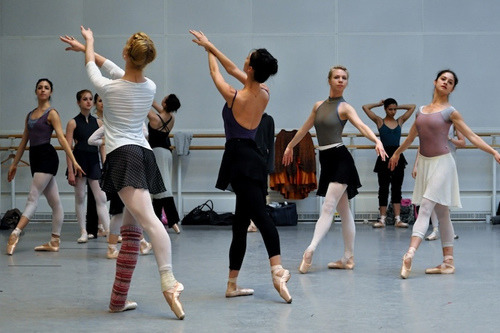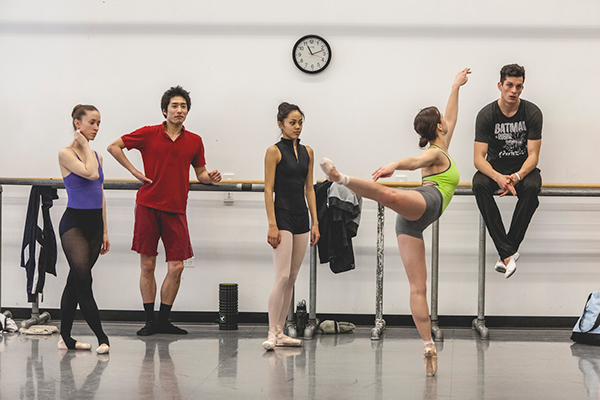 |
| Performing with the cast of CVDA's The Nutcracker |
There are a handful of different payment arrangements that can be made in order to make sure that a freelancer is compensated appropriately and within a respectful time frame. I've spoken about some of these in previous blogs, so I am not going to go into way too much detail here. If a dancer is spending a handful of weeks dancing for an employer, they often receive weekly paychecks or direct deposit into their bank account. But for many freelancers, especially during times like the holiday Nutcracker season, directors often save payment until the end of the last performance of a series. While I have sometimes received a nice little thank you note with payment at the top of my last show, it is much more common to be handed a check after you've received your applause, taken off your makeup, and changed into street clothes. This makes sense, especially if this is your first time working for a company or school. The organization likely wants to be sure you fulfill all of your contractual obligations before handing over your handsome fee. Sometimes, this transaction is taken care of quickly and goes over without thought or attention. Other times, you may be ready to head home, to your hotel, or to the airport, and wondering when you are going to be compensated for you artistic services.
For my student, he found himself in an awkward predicament. He wasn't performing or bowing in the second act, plus he had a local friend ready to drive him to the train back into the city. Since the train wasn't until later, I suggested he wait around and watch the rest of the show. I offered this advice for one reason. The director of a show, who usually issues payment, is likely overwhelmed with the process of making sure that the performance is running on track. From dancers to crew to wardrobe, audience, and beyond, there are many aspects of a show that a director must take care of in order to keep things running smoothly. To stop the director in their tracks asking for payment could be a huge distraction and may even make your intentions and desire to work come off greedy. You don't want it to look like you are only focused on the paycheck. You are a part of a production and there is a certain amount of excitement, emotion, and cultural etiquette that can quickly be cut off or broken by asking for payment. This may be especially true if you head out before the show is over. You want to be supportive of the show and your cast, especially if you are performing for a school and being brought in as a role model.
Now, if you absolutely have a time crunch where you need to get out of the theatre to catch transport, be sure to discuss this with the director prior to the beginning of the show. This is quite understandable, but should be addressed in advance. Usually, the director will make sure that they or an advocate are available to pay you on your way out. Or they often will just give you payment at the top of the show.
So, what do you do if the show has finished and you still haven't been paid? Sometimes, the overwhelming chaos at the end of a production can make a director forgetful, as the crew loads out, the wardrobe collects costumes to be cleaned and stored, and the dancers congratulate one another and change into street clothes. It is possible that intentions can get lost. In this situation, it is perfectly appropriate to seek out the director and request payment. This can be a bit awkward since nobody likes to talk money. But I find that writing a simple thank you card and handing it to them after the series can be an easy pathway to remind them that they owe you something. Think along the lines of a reminder that some type of exchange should be happening. Beyond this, it is good etiquette and relationship building to do this. If you didn't think ahead and get a thank you card, be sure to say goodbye and offer a verbal thank you. And if you still aren't handed your hard-earned salary, do ask when you should expect to receive a check. This is a customary way of saying, "I need to be paid", without demanding it. Usually, by this point, you will be collecting your salary. If not, then that is an entirely different conversation and blog post.
It is a rare occasion when payment isn't received at the end of a show, unless another arrangement has been agreed upon. As I always say, make sure you get an idea of when you should receive payment in writing (or at least in an email). It is never appropriate for an employer to pay you whenever they feel like it. You should know when to expect payment in order to keep track of whether you've been compensated or not. In fact, New York City recently passed the Freelance Isn't Free Act (have they been reading my blog 😉), which requires any freelance artist that makes more than $800 with an organization to have a written contract and receive payment in full within 30 days. This seems like a fair guideline to hold all organizations to, whether you live in New York City or not.
As I've stated many times in this blog, money can be one of the most awkward and uncomfortable things to discuss. But it is important that you get paid within an appropriate time frame. If you don't know when to expect being paid, don't wait around hoping it will happen. Be proactive and start a conversation. Just make sure that you don't start that conversation too late or in the middle of a hectic performance.
 |
| Be sure to check out my Holiday Shopping Ideas for Dancers on Pas de Chát: Talking Dance on iTunes - Me & my niece playing around before Nutcracker |













